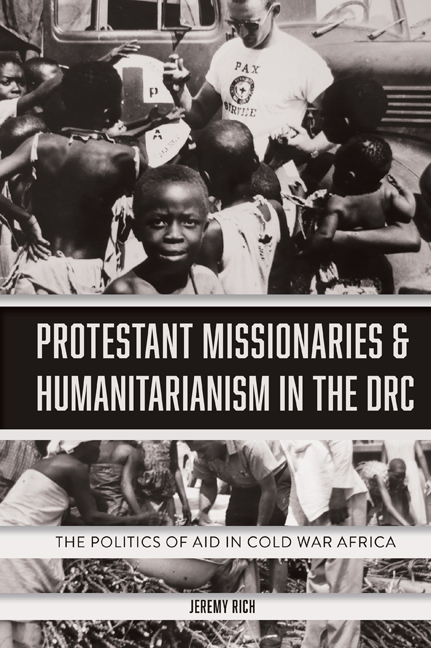Book contents
- Frontmatter
- Contents
- List of Illustrations
- Acknowledgements
- List of Abbreviations
- Introduction
- 1 The CPRA, Protestant Missions, and the Congo Crises, 1960–1965
- 2 The CPRA and Luba Refugees in South Kasai, 1960–1962
- 3 The CPRA and Angolan Refugees in the DRC, 1961–1967
- 4 The CPRA and the Simba Revolts, 1964–1967
- 5 Operation Doctor: The Rise and Fall of a Protestant Short-Term Medical Volunteer Programme
- 6 Protestant Volunteers and Medical Practice in the Congo in the 1960s
- 7 Changing Dollars into Zaires: The Challenges of a Humanitarian Aid NGO in the DRC, 1965–1973
- 8 The Centre for Community Development
- Conclusion
- Bibliography
- Index
1 - The CPRA, Protestant Missions, and the Congo Crises, 1960–1965
Published online by Cambridge University Press: 11 September 2020
- Frontmatter
- Contents
- List of Illustrations
- Acknowledgements
- List of Abbreviations
- Introduction
- 1 The CPRA, Protestant Missions, and the Congo Crises, 1960–1965
- 2 The CPRA and Luba Refugees in South Kasai, 1960–1962
- 3 The CPRA and Angolan Refugees in the DRC, 1961–1967
- 4 The CPRA and the Simba Revolts, 1964–1967
- 5 Operation Doctor: The Rise and Fall of a Protestant Short-Term Medical Volunteer Programme
- 6 Protestant Volunteers and Medical Practice in the Congo in the 1960s
- 7 Changing Dollars into Zaires: The Challenges of a Humanitarian Aid NGO in the DRC, 1965–1973
- 8 The Centre for Community Development
- Conclusion
- Bibliography
- Index
Summary
The Congo Protestant Relief Agency's work depended on a wide array of international donors. From the standpoint of the donor institutions who supplied the CPRA with the funds and the materiel that kept it running, Protestant aid constituted one provider to deal with the humanitarian challenges of the DRC. US officials recognised full well the political implications of famines, unemployment, refugees, and internally displaced peoples. The US Agency for International Development (USAID) harnessed the CPRA to distribute food supplies authorised by the Public Law 480 Food for Peace Programme. The United Nations also considered the CPRA as an ally in its efforts to promote a stable Congolese society. Christian international organisations such as the World Council of Churches sponsored the CPRA to ally themselves with Congolese Protestants in the aftermath of decolonisation. Congolese authorities, whose commitment to social programmes wavered at best, turned to Protestant aid to make up for their own lack of resources. Finally, the impoverished Congolese churches that ostensibly presided over the CPRA had their own pressing need for resources.
Each one of these donors placed their own agendas on the CPRA. Some sponsors had a steady set of guidelines for Protestant aid. USAID required the CPRA to monitor and account for how US government food donations were transported and distributed. Though US officials watched over CPRA food distribution, they had little interest in the internal dynamics of how expatriates managed and organised the CPRA. The World Council of Churches (WCC) also asked for financial information, but its vision of a transnational partnership between Christians in the Global North and South also impacted the CPRA. WCC staff sometimes felt the US and Canadian expatriates did not listen enough to Congolese church leaders, who had very little control over the CPRA until 1965. The United Nations civilian operations in the Congo made common cause with the CPRA at certain moments, but spent less time tracking supplies than USAID and had no interest in the CPRA's organisation. Even if all of the CPRA's sponsors considered the Congo to be a humanitarian disaster in the 1960s, their negotiations and impositions on Protestant aid varied.
- Type
- Chapter
- Information
- Protestant Missionaries and Humanitarianism in the DRCThe Politics of Aid in Cold War Africa, pp. 29 - 58Publisher: Boydell & BrewerPrint publication year: 2020



